140 anniversary of the birth of the founder of the domestic neurosurgery Nikolai Nilovich Burdenko
The childhood of the famous in the future Soviet surgeon was held in the village of Kamenka, Nizhne-Lomovsky district, Penza province. The father of the future surgeon was Neil Karpovich, the son of a serf who served first as a clerk with a small landowner, and then as a manager of a small estate. Here, in Kamenka, before 1885, Nikolai Burdenko studied at the local Zemsky school, after which he moved to Penza, where he studied at the Penza religious school from 1886. After graduating from it, in 1891, he enters the Penza Theological Seminary, which he graduates in 1897. Prior to that, his whole life path said that he would devote himself to religion. He perfectly exams at the St. Petersburg Theological Seminary, but for some reason he thinks better of entering there, drastically changing his decision. Because of what happened, it remained a mystery. Now he firmly wants to link his life with medicine.
1 September 1897 of the year Burdenko arrived in Tomsk, where he entered the newly opened Medical Faculty of the Tomsk Imperial University. Three courses, being in Tomsk, he studied the art of dissection, as well as how to properly prepare anatomical preparations. In the process of training, Nikolay Burdenko proved himself very well, therefore, already in the third year, he was appointed assistant prosector. As a student, he took part in the riots that arose at Tomsk University in connection with the movement that encompassed all Russian students in the 1890s. In 1899, he was expelled from the university for the first time for participating in the first Tomsk student strike, but later applied for restoration and returned to the university. However, in 1901, his name again appeared in the list of strikers, according to one of the versions, it turned out there by pure chance. Anyway, he was a second time expelled from the university.
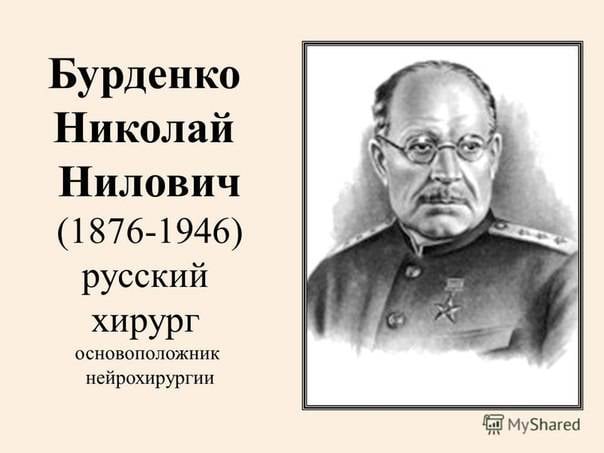
After that, he left Tomsk and continued his studies at Yuryev University (today the city of Tartu). He was enrolled in the 11 University in October 1901, Burdenko was restored to the 4 course of the local medical faculty. Continuing his studies, he did not stop participating in student promotions and student political movements. After participating in one of the student gatherings, he was forced to interrupt his studies. At the invitation of the zemstvo, he went to the Kherson province, where he was engaged in the treatment of acute childhood diseases and typhus. It was here, in his own words, that he first joined the practice of surgery. After working for almost a year in a colony for children with tuberculosis, he returned to Yuriev University (not without the help of professors from this institution). It was in Yuriev that Burdenko became acquainted with the works of the great Russian surgeon N. I. Pirogov, who made a very strong impression on him.
With the beginning of the Russian-Japanese war, Nikolai Nilovich volunteered to join the military sanitary squad. For almost a year on the battlefields in Manchuria, he practiced military surgery in field practice, being a medical assistant. Being in the "volatile sanitary squad", he simultaneously performed the duties of a doctor, a medic, a paramedic. During the battle at Wafangou at the time of the removal of the wounded Burdenko from the battlefield, he himself was wounded by a rifle shot in the arm. For his heroism, he was awarded the soldier’s Cross of St. George.
In December 1904, he returned to Yuriev in order to thoroughly prepare for the examinations for the title of doctor. Already in February 1905, he was invited as an intern at the surgical department of the Riga City Hospital. As a result, he graduated from Yuryevsky University only in 1906, having passed the necessary state exams and received a diploma with honors. At the same time, in 1906, this was already a fully accomplished doctor with practical experience and extensive knowledge. Since 1907, Nikolai Burdenko worked as a surgeon in the Penza Zemsky hospital, combining this activity with scientific work and writing a doctoral dissertation, which he successfully defended in 1909, becoming a doctor of medicine. In the same year he went to practice abroad, having spent a year in clinics in Switzerland and Germany. Returning from a trip abroad, since June 1910, he has been assistant professor in the department of surgery at Yuryevsky University Clinic, since November 1910 has been an extraordinary professor in the department of operative surgery, desmurgy (medicine section studying the technique of dressing and splints) and topographic anatomy.
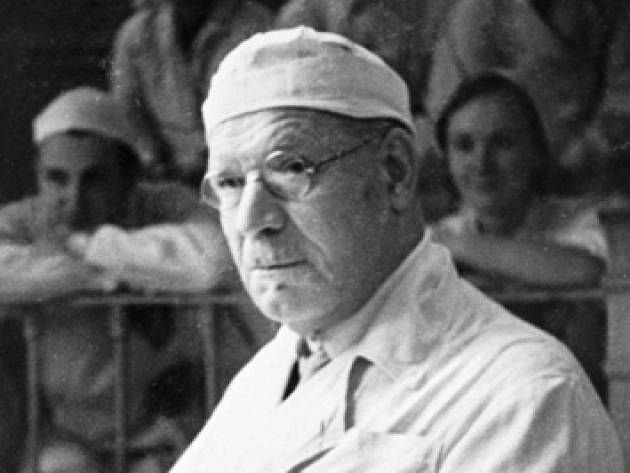
World War I
By the time of the outbreak of the First World War, Burdenko was already an accomplished surgeon who had made a name for himself. After the start of the war, he once again voluntarily decided to go to the front, was appointed assistant to the head of the medical unit of the Red Cross in the armies of the North-Western Front. He arrived in the army in September 1914 of the year. He managed to take part in the offensive in East Prussia, as well as the Warsaw-Ivangorod operation. During the fighting, Nikolay Burdenko organized field medical institutions and dressing and evacuation centers, personally provided emergency surgical assistance to seriously wounded soldiers at the advanced dressing stations, often falling under fire. Successfully organized the evacuation of more than 25 thousands of wounded in conditions of limited sanitary transport and military inconsistency.
In order to reduce mortality among the wounded and the number of amputations carried out, Nikolay Burdenko paid great attention to the problems of sorting the wounded (so that the wounded were sent to those hospitals where they could be provided with qualified assistance) and their speedy transportation to hospitals. High mortality among soldiers and officers wounded in the stomach, which were transported over long distances, prompted Burdenko to organize the organization of fast operations for such wounded in the Red Cross medical institutions closest to the line of hostilities. Under his direct control, specialized wards for wounded in the stomach, in the skull, in the lungs were organized in Russian hospitals.
During the First World War, Nikolai Nilovich carried out quite a lot of operations in both army and field hospitals. He actively promoted the idea of an open method for the treatment of cranial and cerebral wounds. First time in stories Field Surgery Burdenko used the primary treatment of the wound and suture for injuries to the skull, then transferring this method to other sections of the surgery. Under the influence of the works of Pirogov, Burdenko thoroughly studied the organization of anti-epidemic and sanitary services, dealt with issues of sanitary and chemical protection, military hygiene, prevention of sexually transmitted diseases. All the years of the war, he actively sought to improve medical care for the wounded at all stages, starting with their evacuation from the battlefield. From 1915, Nikolai Nilovich Burdenko became a surgeon-consultant for the 2 Army, and starting from 1916, he became a surgeon-consultant for Riga hospitals.
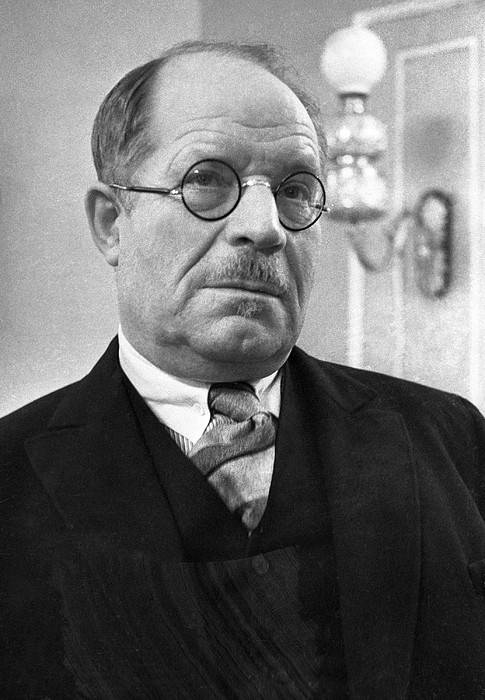
Revolution and the post-revolutionary period
In 1917, Nikolai Burdenko was contused at the front and for this reason he returned to Yuryevsk University, where he headed the department of surgery. Later he was an ordinary professor at the clinic of the faculty of surgery at the same university. In 1918, he finds himself in Voronezh, where he manages a surgical clinic, being also a professor at the University of Voronezh. It was here that the clinic was evacuated from Yuriev, since the city was occupied by German troops. In 1923, at the Medical Faculty of Moscow University, he headed the Department of Operative Surgery and Topographic Anatomy. In 1930, the Faculty of Medicine was renamed the Moscow Medical Institute, where he headed the department and the surgical clinic until the end of his days. After moving to the capital in 1923, for the next six years, Burdenko was engaged in clinical activities, but in peacetime conditions.
In this time period, the main topics of his research were military field surgery, neurosurgery, and general surgery. Among other things, Nikolay Burdenko dealt with the treatment and prevention of shock, the treatment of common infections and wounds, the surgical treatment of tuberculosis, the neurogenic interpretation of peptic ulcer, blood transfusion, pain relief and many others. Having accumulated quite a lot of knowledge during the war years, Nikolay Nilovich considered it necessary to single out neurosurgery into an independent scientific discipline.
In 1933, Nikolai Burdenko was awarded the title of Honored Scientist of the RSFSR, and in 1939 he was awarded the title of Academician of Sciences of the USSR. Since 1937, he has been the chief surgeon-consultant in the sanitary administration of the Red Army. In the 1939-1940-s under the direction of E. N. Smirnov and N. N. Burdenko, a guide was drawn up which was called the “Materials on military field surgery”. Approximately 40 of various authors was involved in the creation of the book. In the written work were listed: the study of wounds, sanitary and tactical foundations of surgical care, highlighted the issues of specialized care, and outlined the concept of primary treatment of wounds. It is also worth noting that in the USSR it was Burdenko who was one of the first to introduce into the practice of clinical work the surgery of the peripheral and central nervous system, working on the creation of theoretical and practical parts. For his work in this direction, he was awarded the prestigious Stalin Prize.
Great Patriotic War
During the Soviet-Finnish War, Burdenko volunteered for the third time into the army. In the 1939-1940, the 64-year-old surgeon was at the front, directly involved in organizing the necessary level of medical conditions for the wounded. According to the experience gained in the Soviet-Finnish war, he will create a provision on field surgery.
After the start of World War II, Nikolai Nilovich was drafted into the ranks of the Red Army 1 August 1941. In the same year he became the Chief Surgeon of the Red Army, so he spent a lot of time on the fronts. Often, in order to carry out truly complex operations, he had to get to the regimental and divisional medical battalions. During World War II, he personally performed thousands of fairly complex operations. Also Burdenko organized the work on the operational collection of materials about injuries and the early implementation of the latest treatment methods. During the war, he created the doctrine of battle wounds.
In the 1941 year, having been bombarded, when crossing the Neva, Burdenko was wounded for the second time in his life. At the end of September of the same year, already near Moscow, when inspecting the military ambulance train arriving from the front, Nikolai Nilovich had his first stroke. The renowned doctor was forced to go to the hospital for two months and almost completely lost his hearing. At the same time he was evacuated from Moscow, first to Kuibyshev, and then to Omsk. Not yet fully recovered from the effects of the stroke, he had already begun to treat the injured who arrived from the front, and also corresponded quite actively with front-line surgeons. On the basis of accumulated observations, Burdenko wrote a number of studies, issuing them in the form of 9 monographs dealing with issues of military field surgery.
In addition, at the head of the team of doctors Burdenko conducted a test of new drugs - penicillin, sulfidine and streptocide. Tests of new drugs were in front-line hospitals. Soon, at his insistence, these medicines began to be used by surgeons at all military hospitals without exception. At the same time, many thousands of wounded soldiers and officers of the Red Army were rescued, thanks to the scientific search that Nikolai Burdenko led during the war.
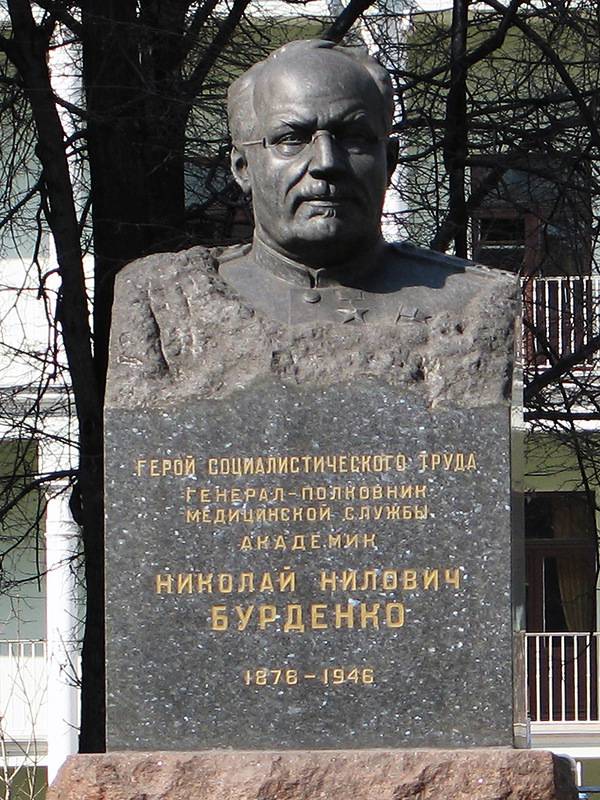
30 June 1944 of the year already at the end of the war, on his initiative and in accordance with the plan developed by Burdenko, the USSR Academy of Medical Sciences (AMN) was established in the Soviet Union. The newly created body was subordinated to the USSR Commissariat of Healthcare. From 20 December 1944 to 11 November 1946, Nikolai Nilovich served as the first president of the USSR Academy of Medical Sciences. Despite the difficult state of health, he was actively involved in the development of this medical academy.
Six months before his death, Nikolai Burdenko made a large program article in which he spoke about the problems of Soviet post-war medicine. In June, the 1945 of the year was struck by a second stroke. Despite this, Burdenko continued to take part in meetings of the Scientific Medical Council, as well as the Main Military Sanatorium Administration. In the summer of 1946, he suffered a third stroke, from the effects of which he had not recovered. In fact, he was in a death state for a very long time. From 1 to 8 in October, the XXV All-Union Congress of Surgeons was held in the capital, Nikolay Burdenko was elected as its honorary chairman, who, for understandable reasons, could not speak at the congress on his own. His report, which was written in a hospital bed and was devoted to the treatment of gunshot wounds, was read out by one of his students. 11 November 1946, Nikolai Nilovich Burdenko died in Moscow from the consequences of the last stroke at the age of 70. The urn with the ashes of the famous surgeon was buried in the Novodevichy cemetery of the capital.
The memory of Burdenko was immortalized in our country. The Research Institute of Neurosurgery in Moscow, the Main Military Hospital, the Voronezh State Medical University were named after him. Also, the streets in Voronezh, Penza, Moscow, Novosibirsk, Nizhny Novgorod and Donetsk were named after the famous surgeon. And this is not a complete list.
Information sources:
http://www.tonnel.ru/?l=gzl&op=bio&uid=639
http://professiya-vrach.ru/article/velikiy-voennyy-khirurg-nikolay-nilovich-burdenko
http://www.warheroes.ru/hero/hero.asp?Hero_id=9096
Open source materials
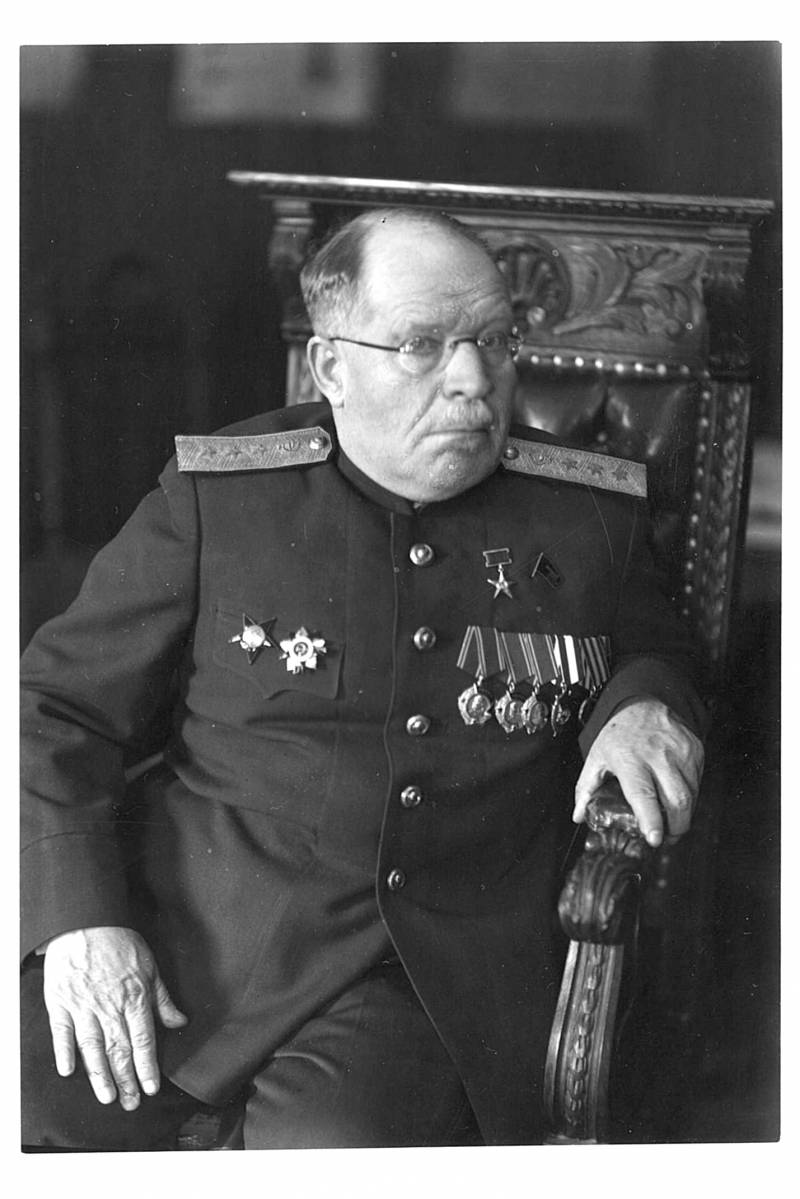
Information